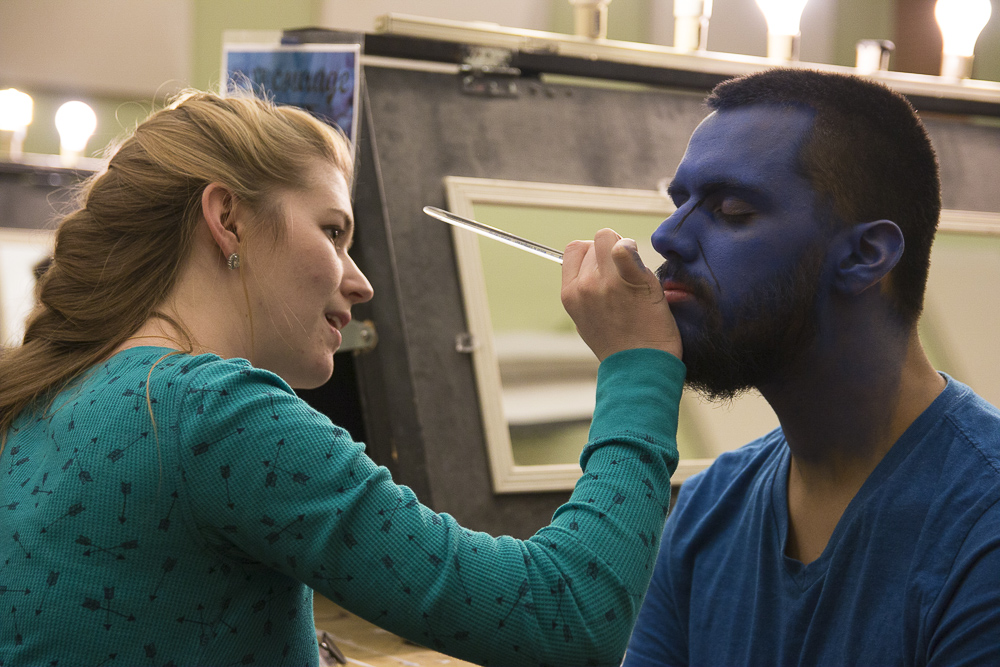Biola Opera performed their unique interpretation of Mozart’s “The Magic Flute” on Feb. 5-7 and 12-14, combining classical music and science fiction in a Star Wars-themed extravaganza. Incorporating vocal performance, stage acting and orchestrated score, the opera is an exciting production directed by Richard Zeller, assistant professor of voice.
WIDELY PRAISED
“The Magic Flute” was originally written in German by Wolfgang Amadeus Mozart and Emanuel Schikaneder, premiering in 1791. Since then, it has become the fourth most performed opera in the world, widely praised for its comedic writing as well as its intricate musical score.
“Opera is different from instrumental music in that you have to know what you’re saying, even though it’s a foreign language,” said David Chung, sophomore music performance major who played Sprecher, the speaker of the temple. “You have to express it with your face and the expression in your voice.”
COUNTLESS HOURS
The story follows an earnest young prince named Tamino who journeys into a foreign land ruled by the Queen of the Night. The Queen sends Tamino on a quest to rescue her beautiful daughter Pamina from a sorcerer named Sarastro. Accompanied by the silly bird-catcher Papageno, Tamino uses his magic flute to approach the sorcerer’s castle. Throughout their journey, the two learn about patience, true love and the ultimate triumph of light over darkness.
Biola’s production of “The Magic Flute” was a pleasant surprise, showcasing loveable characters, a lively score and outstanding performances. Despite its age, the opera was romantic, dramatic and funny to a contemporary audience, as it included engaging visual comedy as well as eccentric acting with a modern touch. The set was extremely resourceful, and the costume and makeup designs were a great shout-out to fans of series such as Star Wars and Star Trek. The music was also incredibly impressive, with vocal and instrumental talent lasting the entire night. One of the most riveting moments was the Queen of the Night’s aria, which required intense versatility and passion. While the show was long, it was consistently exciting and interesting — there was never a dull moment.
However, a show this intense required a lot of preparation, from the staging to the choreography, memorization and practice.
“There’s countless rehearsal hours,” said Bradley Naden, senior music major who played Tamino. “We did six hours a day for four weeks — and that was just all together. Last semester, we did the music rehearsals on Fridays and Wednesdays, so that was six hours a week.”
Compounded with the tight schedule of a music major, it was a strenuous feat for many of the performers. Although the production process was difficult, there were many fun factors in the development of the opera.
“My favorite part of being a part of this production was learning to project my voice over the orchestra without the aid of a microphone,” Chung said. “And also, learning how to navigate the stage with my visual impairment. It’s a lot of fun, and it’s a challenge, as well.”
A DIVERSE TEAM
The opera was open to all music ensembles and included a diverse creative team, combining efforts from many different disciplines.
“I love that it… integrates so many different ensembles, so that everyone can make a sound together and work on something together,” said Amalia Moghadasnia, English major and a member of the opera chorus.
Moghadasnia emphasized that, regardless of major, all students can have a chance to be involved in music productions like the opera.
“Everyone should try out for music, no matter what,” Moghadasnia said. “That’s how I got involved as a non-music major, non-music minor. I think everyone should pursue music, even if it’s just going to see the opera — even if it’s just sitting in the audience and participating that way.”







